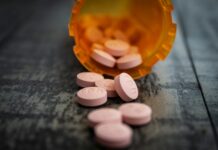A recent article in the American Journal of Public Health calls for policy level interventions to reduce the use of benzodiazepines, drugs commonly prescribed for anxiety, after presenting data on their increased use and the high rate of overdose deaths. Tracking medical data from 1996 to 2013, the researchers conclude the benzodiazepine prescriptions and overdose deaths have increased considerably.
“In 2013, an estimated 22,767 people died of an overdose involving prescription drugs in the United States.” “Benzodiazepines,” the researchers write, “were involved in approximately 31% of these fatal overdoses.”
Using medical prescription records and cause of death data from the CDC, the researchers estimated the total quantity of benzodiazepine prescriptions and overdose deaths in the United States between 1996 and 2013. They found that the number of adults filling prescriptions for these drugs increased 67% (from 8.1 million to 13.5 million) and that the total quantity of benzodiazepines being disbursed more than tripled.
Also, the data showed that people getting prescriptions for benzodiazepines were given more of the drug than in the past. The median quantity filled over the course of a year for a patient increased by 140%. According to the CDC data, the rate of overdose deaths increased more than 4-fold by 2010 and then began to plateau overall. Overdose deaths continued to climb for minorities and the elderly, however.
The researchers underscore the public health implications of these findings:
“In summary, the number of American adults filling a benzodiazepine prescription is increasing, and the quantity filled is also increasing. Although the rate of overdose deaths involving benzodiazepines has stabilized overall and in most groups, it remains more than five times the rate at the start of the study period. Continued increases in overdose deaths involving benzodiazepines among certain groups (e.g., older adults and racial/ethnic minority individuals) are concerning. Furthermore, we found no evidence of reductions in any group. Interventions to reduce the use of benzodiazepines or improve their safety are needed.”
*
Bachhuber, M. A., Hennessy, S., Cunningham, C. O., & Starrels, J. L. (2016). Increasing Benzodiazepine Prescriptions and Overdose Mortality in the United States, 1996–2013. American Journal of Public Health, (0), e1-e3. (Full Text)















Overdose death from benzodiazapines is caused by excessive central nervous system depressing that cause symptoms beginning with respiratory depression and if CNS is severe enough then sudden cardiac arrest.
What is not being pointed out about this obvious anti-benzo campaign, is that this is the exact mechanism by which overdose results from too much alcohol, and that benzos themselves are almost never the sole cause of a drug overdose death. I follow drug deaths and damages very closely and I think it shows a strong anti-benzo bias that these authors aren’t pointing out that virtually everyone in those deaths statistics were also either taking opiates (which themselves are even safer than benzos) or combining the benzos with alcohol.
As is the case with opiates, the big issue is mixing the drugs in dangerous combinations. Not to run campaigns against individual drugs themselves that threaten to leave pain patients writhing in agony and anxiety and panic patients jumping into oncoming traffic.
Report comment
Good comment. Benzos alone, in overdose, are usually not what is going to kill someone. This “positive” aspect was marketed heavily over the drugs that they replaced, which are far more toxic.
I imagine there are people alive today that are grateful they aren’t dead when they attempted to harm themselves with benzos.
Report comment
JeffreyC, you plucked the thought from my mind. Benzos, by themselves, require astronomical levels to fatally overdose on.
Report comment
What isn’t considered in the paper are drugless methods for treating anxiety and panic attacks, say 750-800 mg. of supplemental magnesium/day and 500 mg. (and possibly more) niacinamide/day (which goes to the same receptor sites as benzodiazapines), plus B-complex.
Report comment
I think that what are referred to as and diagnosed as “anxiety” and “panic attacks” are too diverse for anyone to even bother trying to find a single go-to treatment for it. For some, anxiety is that feeling you get when you have to wait in line to use the bathroom. For others, it feels like you’re literally having a heart attack while having a bad-acid-trip-esque neurological episode where you head is the size of a hot air balloon and your limbs keep shrinking, your teeth go numb and your tongue feels like it’s twice the size of your mouth. Consequences can range from losing sleep and pacing around too much to desperation drug and/or alcohol consumption and suicide.
When it comes to anxiety and benzos, I think the patients should be in charge, not the doctors or DEA or anyone else. Especially as long as they can go to any corner store, grocery store or department store in the country and get something many times worse (alcohol).
Report comment
I dunno. I’d take a benzo over long term, high dose SSRI treatment. Benzos are also helpful for extreme emotional states, like mania, hypomania, psychosis, etc. And of course…sleep. Drug sleep isn’t as good as natural sleep, but if you’ve been sleep deprived, a lil bit of Restoril can make a huge difference.
That said…docs’ behavior needs to change. I’ve had 2 docs do quickie tapers off full dose Klonopin, with absolutely no concern about side effects. These days, I do Orthomolecular. The high dose niacinamide makes life much, much easier over the long haul. Anyway, it shouldn’t be OK for docs to yank people off long term sedatives (or any drugs, for that matter) just because…well, who knows. Shrinks will prescribe like its the 60s and then try to act like a Puritan. Its…well, crazy.
Report comment
This anti benzo campaign is starting to sound a little like the war on drugs.
What are we going to do make the US even more of a drug war police state ?
Put a DEA agent in every doctors office and require 30 forms of ID at the pharmacy ?
How about don’t take more than it says on the bottle and you won’t die.
Report comment
Can we get an update on these numbers!
Report comment